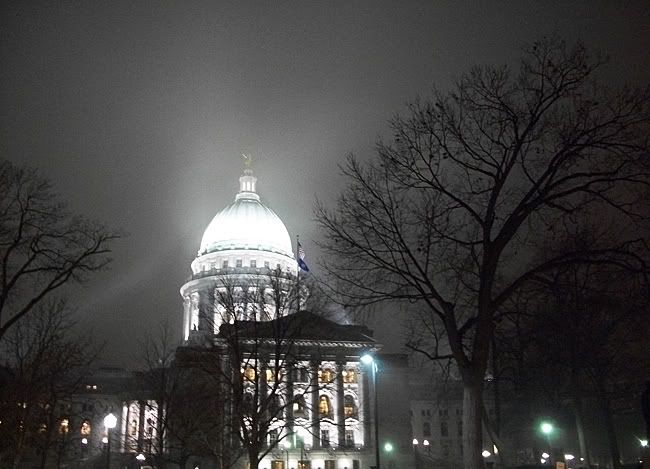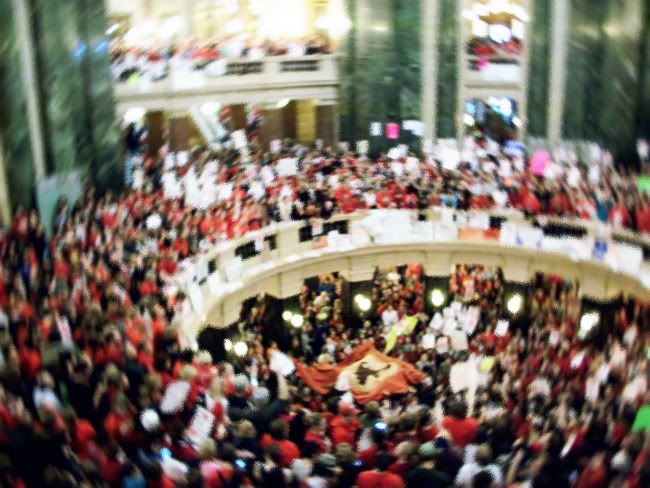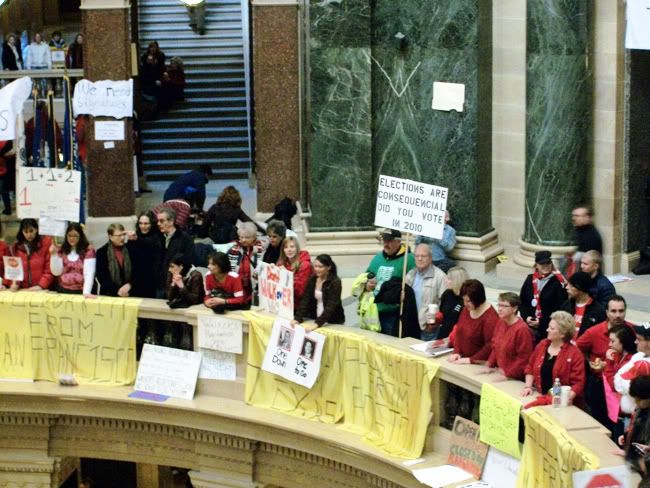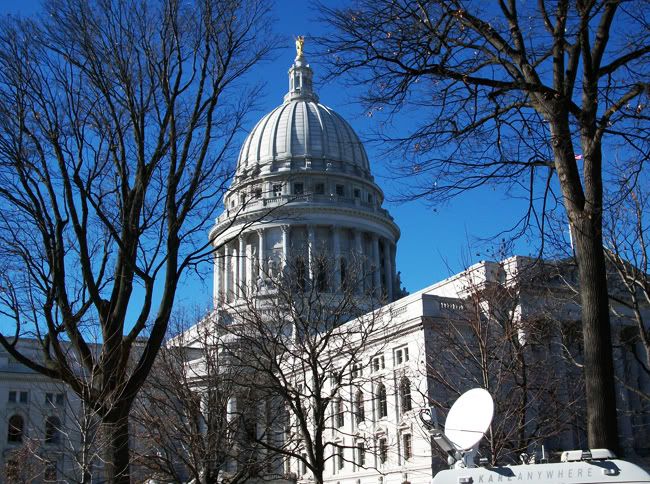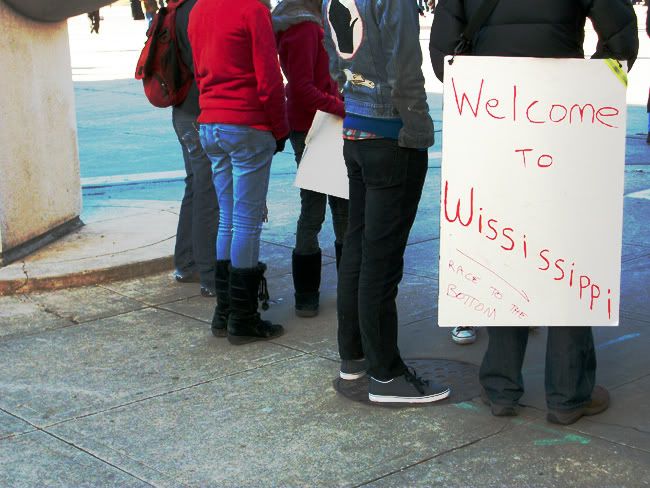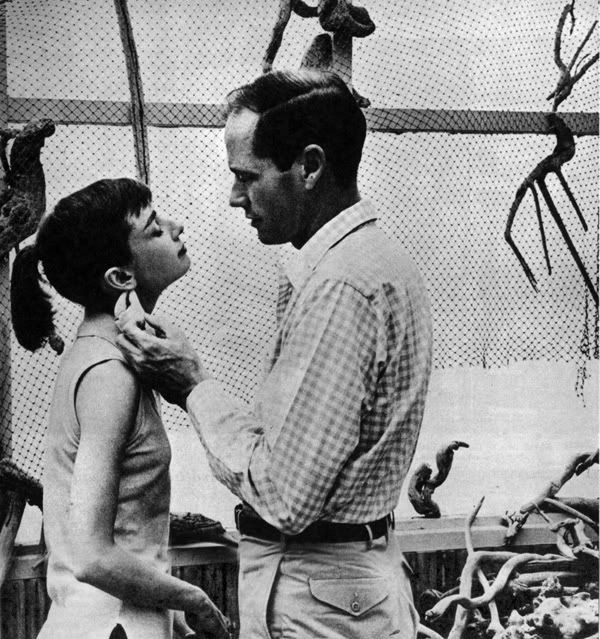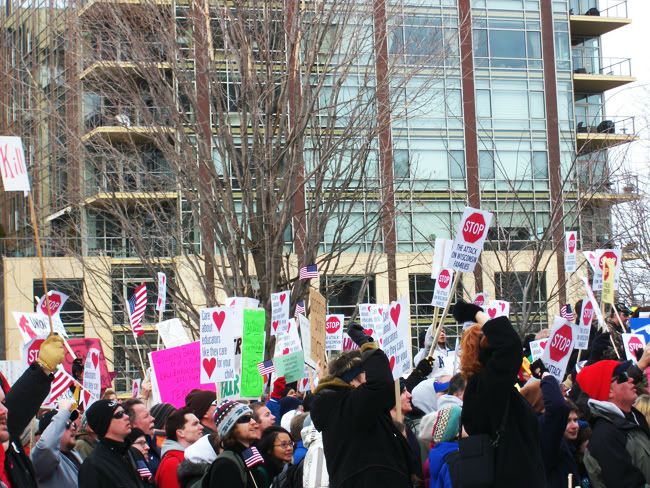Monday, February 28, 2011
Politicians can only think of "movement" from one political cycle to the next.
Plutocracy Now: What Wisconsin is really about, Mother Jones
Maybe it's a relic, but the union model is essential, Matthew Dimick for Salon.com
Saturday, February 26, 2011
And whatever else you put on, wear love.
And I get the usual argument of "$50 bucks will buy me 10 shirts in Walmart/Target," I really do. I'd be a liar if I said that I don't own any ethically suspect pieces myself. And it takes experiences like this for me to realize that I like knowing where my clothes come from. I like knowing they were not made using child labor or that the manufacturer didn't completely ignore local environmental laws. It's the issue of price and cost, really: every cheap piece of clothing has a cost associated with it. Ten bucks is the price, but what is the cost in lost jobs in the US, in the exploited workers overseas, in the environmental damage -- herbicide pollution from cheap cotton production, eutrophication of lakes, desertification, salinization of soils... This is the sort of thing we all are paying for -- be it in increased medical cost, or lost wages, or decreased bargaining power as international conglomerates continue to increase their political influence. They call it externalization: for every sweatshop they build, they are the ones getting the profit, and we are left with splitting the cost and thinking that we somehow got the better of the bargain...
Saturday, February 19, 2011
The national media finally made it.

Mother Jones: What's Happening in Wisconsin Explained
Walker says his legislation, which would strip most state employees of any meaningful collective bargaining rights, is necessary to close the state's $137 million budget gap. There are a number of problems with that argument, though. The unions are not to blame for the deficit, and stripping unionized workers of their collective bargaining rights won't in and of itself save any money. Walker says he needs to strip the unions of their rights to close the gap. But public safety officers' unions, which have members who are more likely to support Republicans and who also tend to have the highest salaries and benefits, are exempted from the new rules. Meanwhile, a series of tax breaks and other goodies that Walker and the Republican legislature passed just after his inauguration dramatically increased the deficit that Walker now says he's trying to close. And Wisconsin has closed a much larger budget gap in the past without scrapping worker organizing rights.
Ezra Klein: Unions aren't to blame for Wisconsin's budget problems
The governor called a special session of the legislature and signed two business tax breaks and a conservative health-care policy experiment that lowers overall tax revenues (among other things). The new legislation was not offset, and it helped turn a surplus into a deficit [see update at end of post]. As Brian Beutler writes, "public workers are being asked to pick up the tab for this agenda."
But even that's not the full story here. Public employees aren't being asked to make a one-time payment into the state's coffers. Rather, Walker is proposing to sharply curtail their right to bargain collectively. A cyclical downturn that isn't their fault, plus an unexpected reversal in Wisconsin's budget picture that wasn't their doing, is being used to permanently end their ability to sit across the table from their employer and negotiate what their health insurance should look like.
That's how you keep a crisis from going to waste: You take a complicated problem that requires the apparent need for bold action and use it to achieve a longtime ideological objective. In this case, permanently weakening public-employee unions, a group much-loathed by Republicans in general and by the Republican legislators who have to battle them in elections in particular. And note that not all public-employee unions are covered by Walker's proposal: the more conservative public-safety unions -- notably police and firefighters, many of whom endorsed Walker -- are exempt.
The New York Times: A Turning Point in Labor History
But collective bargaining there must be- -- not a single-minded devotion to the interests of the most fortunate. That is why Wisconsin workers are right on the issues in Madison -- and why the emulation of Governor Walker by other Republican governors is a step backward away from the civilized world. The unions have made a stand for free people.
and
Since the fiscal crisis began, unionized public sector employees in many cities and states have accepted unpaid furloughs, layoffs and other concessions with hardly a peep – and very little publicity. Why mobilize now?
The rallies in Madison and other cities are about whether working people have any protections against the moneyed interests that bought the last election, not about wages and health insurance premiums. While the rich get richer and middle class prospects diminish, they've seen every opportunity to level the playing field crippled by the same people who supported Governor Walker’s election.
...
Governor Walker is betting that private sector employees who have seen their wages decline and who rarely enjoy the benefits of union contracts will rise up in disgust against their public sector neighbors. He’s betting the images of rallies will disturb those who love order and work stoppages will outrage citizens. What he risks is that other citizens will make common cause with these middle class workers, be inspired by them and join in.
For up-to-the-minute updates:
Friday, February 18, 2011
Thursday, February 17, 2011
I've been at the Capitol five or more hours a day all week (and I know and love people who have been there 20+ hours a day). I watched the Joint Committee on Finance hearing and vote last night from an overflow room in the Capitol. Last night, Jauch, Taylor, Grigsby and Shilling wore heartache in every expression, every crease in their tired clothes. I was there this afternoon when a wild rumor whipped around - the Senate Democrats thwarted the Republicans' efforts to reach a quorum by slipping across the border! The fact that public hearings have continued nonstop for over 80 hours now buys them political cover. Their brave disappearing act buys us time to continue making our noisy case.
U.S. Sen. Dick Durbin, D-Ill., offered a welcome to Wisconsin state senators, many of whom are believed to have headed into his state as they delay a vote on the budget repair bill.
"When Wisconsin Governor Scott Walker decided to refuse federal high speed rail money, I said I would welcome it with open arms in Illinois. Tonight, I say the same to the members of the Wisconsin State Senate who are fighting for workers’ rights," Durbin said.
Monday, February 14, 2011
Don't break our hearts.
Heading over after work tomorrow. Wouldn't it be something if the hearing went all through the night?
The weather turned suddenly, blissfully mild over the weekend. It's exquisite to be outside for half an hour without a hat. Snowmelt is the best Valentine.
Sunday, February 13, 2011
Thursday, February 10, 2011
The Protect Life Act? Really? Whose?
Saturday, February 5, 2011
This becomes more obviously true every day.
JOHN MUIR.
Friday, February 4, 2011
Cleanly, sustainably, humanely.
Thoughts on the food movement on Grist.
And Michael Pollan weighs in...
But there are many who recognize the real cost of artificially cheap food–to their health, to the land, to the animals, to the public purse. At a minimum, these eaters want a bill that aligns agricultural policy with our public-health and environmental values, one with incentives to produce food cleanly, sustainably and humanely.

